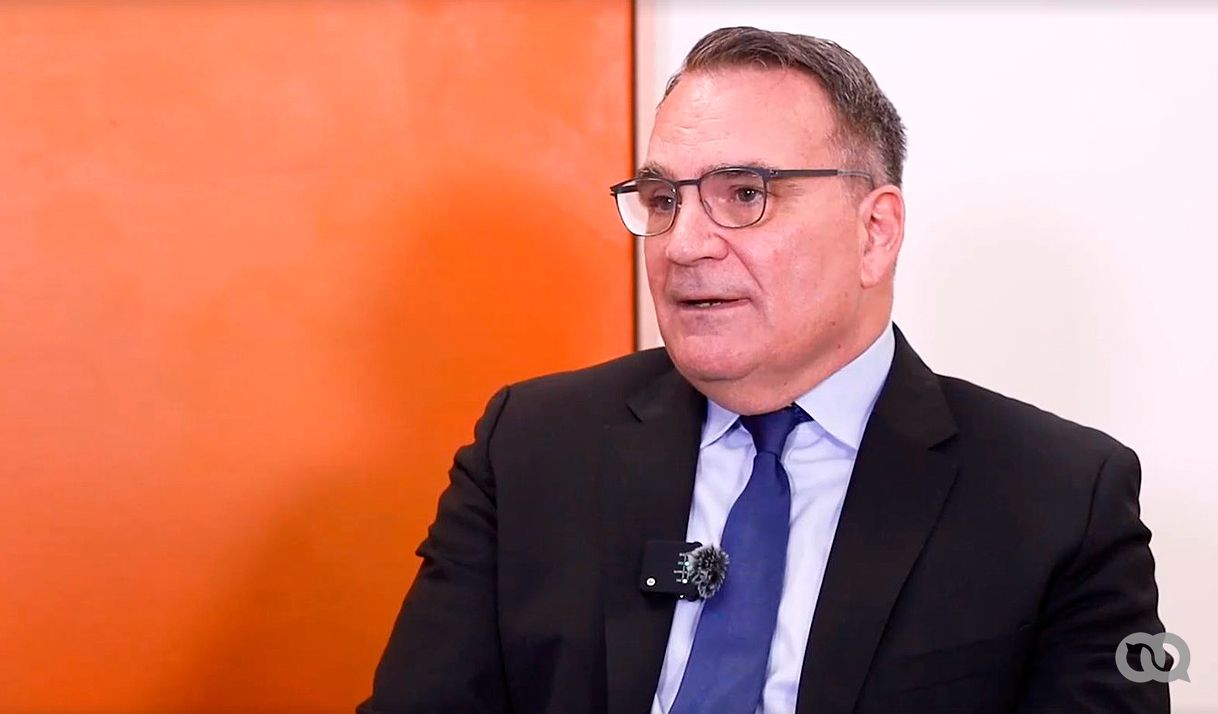
Benjamin Ziff, the Chargé d’Affaires at the U.S. Embassy in Havana, Cuba, since July 2022.
Interview with the US Chargé d’Affaires in Cuba
28 / febrero / 2023
Benjamin Ziff, the Chargé d’Affaires at the US Embassy in Cuba since July 2022, agreed to talk to El Toque recently about matters linked to human rights activism on the island; the imprisonment of political prisoners; its support for activists, journalists, artists and business owners; as well as the US Embassy’s role in Havana, and its current and future ability to deal with visa applications.
The following is the full conversation that Benjamin Ziff had with Ana Lidia Garcia, journalist and editor at El Toque.
Thank you so much for agreeing to this interview so that the El Toque audience can learn about the US Embassy in Cuba’s work.
It’s a pleasure to be with El Toque, a well-respected platform that everyone follows.
I’d like us to start off by talking about how the current economic crisis in Cuba is hindering the US Embassy’s work in Cuba.
This is a matter that the general public doesn’t really get an insight into. As a result of COVID-19 and relations between Cuba and the US, the US Embassy in Cuba has been very limited in the past five years, in terms of consular services, logistics and the building itself.
To reestablish and resume activities at the Embassy, we obviously need to create a viable building that works to pick up on activities and bring back personnel. There is a blue line painted in the basement of the Embassy which tells you how far the water came in when Hurricane Irma hit, which caused a lot of damage to sensors, and the Embassy’s electrical system. The facade is still in a bad way, the doors didn’t close, the fence was rusty and it needed to be replaced.
Logistical conditions and a lack of supplies to do this work on the island meant that it took a long time to resume services. Thank God, we’re in a better situation now. We’ve doubled the number of officials at the Embassy, the number of consuls working on visa-related matters, and we have contractors who are working to resume services and repair the Embassy. We’re on the right track, but we still have logistical matters to sort out and we have the issue of not being able to work normally on Cuban soil.
Multiple-entry visas haven’t been granted to develop tourism between Cuba and the US for a few years now. Is there any chance that this kind of visa will be granted in the immediate future?
Family reunification has always been our priority, and this entails an immigrant visa. As consular services haven’t been running for almost five years, we have a backlog of cases, thousands of immigrant visa cases that have had to be processed with less personnel than we would have liked. We are resuming this service, like I said, and we are increasing the number of consuls to deal with the heap of applications and moving forward with family reunification and immigration visa applications before considering giving out any other kind of visa.
In January, we resumed immigration visa services that had been in Guyana. Everything has been focused on Cuba up until now. We have consuls who are heavily involved and dedicated to this work, but we still only have about a third of the normal number of consuls working and we are still trying to increase this number. We’ll be able to deal with immigration visas, and we’ll see if we can go back to issuing tourism visas in the future. But we still need to sort out the immigrant visas first.
So, the US Government and Embassy are willing to extend their services and grant more visas.
We want to have a human relationship between the United States and Cuba, that is positive and convenient for both countries, and that helps family, trade and tourism relationships be more or less normal.
How does stepped up repression restrict and hinder the US Embassy’s work to develop civil society in Cuba?
The US Embassy in Cuba’s first priority is human rights and the Cuban people’s wellbeing. The Embassy and policies announced by the President [Joe Biden] in May last year, are geared towards empowering the Cuban people so that they can have a future free from political repression and economic hardship. Flights, remittances, growing connections between Cuban family members in the US and Cuba are all a result of these policies.
We won’t stop advocating for communities being repressed in Cuba. There should not be 700 people in prison after the peaceful protests on July 11th [2021] or for there to be a thousand political prisoners. There isn’t a meeting or gathering with the Cuban Government and officials where we don’t touch upon this subject and we don’t advocate and turn up the pressure so that these people who have so unjustly imprisoned are released.
How do you support the development of civil society representatives without putting their safety in danger?
We have to, first of all, say that these people are very brave. They have a lot of courage trying to work in a repressive climate like in Cuba, which has so many experiences of repression, intimidation, sending into exile and imprisoning those who are trying to recover the rights they have according to the Cuban Constitution. It’s very difficult work.
We can support them, amplifying dissidents’ voices. We are privately coordinating with our allies and friends, both on the island and abroad, so that we can speak with a single voice about the need to release prisoners and to coordinate our efforts together so that people see that the Cuban Government’s policies are unjustified and need to stop. Everyone needs to fight injustice. I hope that we are able to get Cuba’s ruling elite to understand that this isn’t fair, it isn’t right and it needs to be fixed.
Can you give us some recent examples of support to developing Cuban civil society, activists, independent journalists, small business owners?
We have applied visa sanctions against more than 50 Cuban officials. There are also sanctions at different provincial and national levels. We are privately taking action with lots of countries so they too can place pressure on Cuba to release prisoners and for them to see how counter-productive these policies are that are neither just nor right; but nor do they help Cuba’s key problem, which is shortages and a lack of hope.
The latter has driven 320,000 Cubans to leave their country by illegal means, in 2022. Cuba is losing the seeds of its future and the Government should not turn a blind eye, fail to understand this and not take action or try to implement policies that benefit the Cuban people and country.
What do you think about the work artists and independent journalists do in Cuba?
We now have personnel at the Embassy that can deal with communities and offer support by training, providing contacts, establishing connections with counterparts in the US and worldwide; which would give visibility to Cuban and US art on the island… Cultural ties also help to influence other areas. Ideally, civil society, artists, independent journalists would prosper and work on the island for Cuba, for us and for the freedom of the Cuban people. We are all working towards this goal.
Small private business owners hold an important role in the country, and you also have efforts linked to them.
Cuba’s private sector is real, active and is extremely important because it offers the great bulk of jobs right now. Small and medium actors are working in a very complex situation, but they are managing to get by without any ties to the Government. Cubans are well-known for being great business people, in the US, in Cuba or anywhere else in the world.
Our work, efforts, training and programs to connect business owners and small entrepreneurs in Cuba is geared towards growing that not only benefits business owners, but also to give jobs to the Cuban people, giving them food and income. I believe they are the future of Cuba.
Representatives of the diplomatic corps meet with Cuban officials on certain occasions Is there space at these gatherings to talk about the Cuban people’s advocacy for human rights?
The exchanges we have are the ones we picked up on before the Embassy started offering basic services. It’s not new. We’ve had immigration conferences since the ‘80s, to apply the law since 2015, and we use them to improve the US’ national security. They are very direct conversations that give us the opportunity to raise subjects, such as the unjustified imprisonment of activists, of the 700 people held prisoner after July 11th.
We have the channel to speak directly with Cuban officials and to transmit our concerns and demands for the prisoners’ release. We also ask for protection for journalists and activists, and for dissidents to have the chance to exercise their rights. Cuba needs to stop the practice of preventing citizens from leaving and entering the country freely.
Some representatives of Cuban civil society believe that the US Government and US Embassy in Cuba shouldn’t engage in any dialogue with the Cuban Government. What do you think about this?
Cuba is a very large island, and it holds a very sensitive location in the Caribbean, just 90 miles away from the United States. Human rights are our fundamental interest, but they aren’t our only interest; we have fundamental interests in national security, immigration, cybersecurity, falsification of documents, fugitives who are hiding out on the island… There are a wide range of issues. We can advocate for human rights at the same time we advocate and work to improve our transnational security, and that is what we do.
What has been the thing that has struck you the most during your time in Cuba, a short time, approximately 6 months?
The Cuban people really are friendly and kind. The Cuban people suffer so much, and it makes me sad to see conditions here on the island, but I have a great deal of hope that the Cuban people with support from their friends and family all over the world and Governments such as the US and others, will be able to see a better, free, democratic and prosperous Cuba.
Over the past year, the Cuban Government has denied activists and independent journalists entry into the country. Some US airlines have been linked to these incidents. Some of the latest names are Carlos Manuel Alvarez, Omara Ruiz Urquiola and Anamely Ramos. Has the US Embassy intervened and spoken about this subject with the Cuban Government?
We have spoken about this issue with the Cuban Government. They need to allow their citizens to move freely, nobody should be prevented from returning to their country.
Would you like to take this moment to send a message to readers of independent journalism?
Keep on reading, keep having hope. This work is important, this information is vital. It’s essential the Cuban people on the island understand what is happening in the world and around them, and that they also have the tools available to them to build their future. I am pleased to see independent journalism working and I hope it continues to do so for a very long time and that we see a lot more of it on the island.
We’d like to thank you for this conversation and are sure that readers of El Toque and other media outlets will be grateful for your answers.
This article was translated into English from the original in Spanish.









comments
We moderate comments on this site. If you want to know more details, read our Privacy Policy
Your email address will not be published. Mandatory fields are marked with *